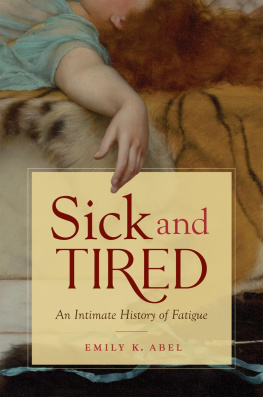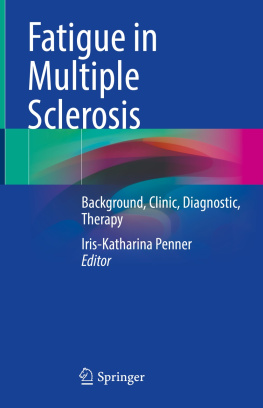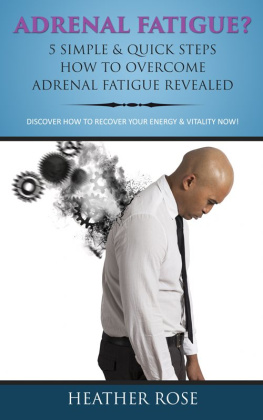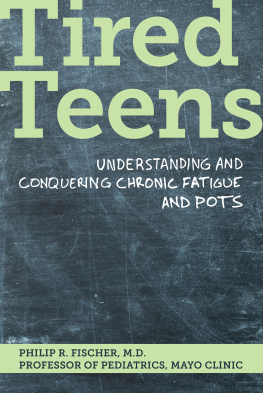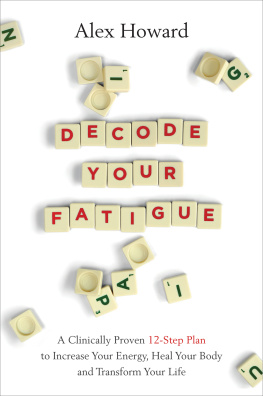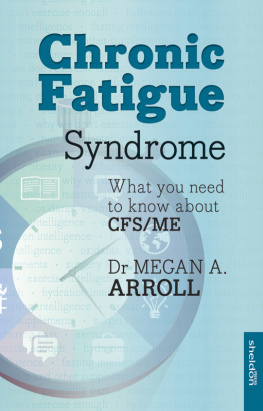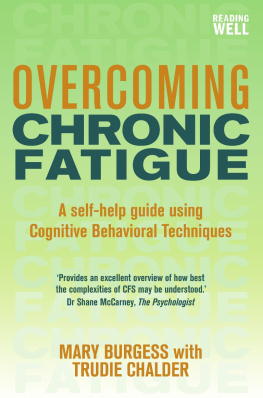This book was published with the assistance of the Lilian R. Furst Fund of the University of North Carolina Press.
2021 Emily K. Abel
All rights reserved
Designed and set in Utopia with Gotham and Univers by Rebecca Evans
Manufactured in the United States of America
The University of North Carolina Press has been a member of the Green Press Initiative since 2003.
Cover illustration: detail from John William Godward, Mischief and Repose, 1895. Digital image courtesy of the Getty Museums Open Content Program.
Library of Congress Cataloging-in-Publication Data
Names: Abel, Emily K., author.
Title: Sick and tired : an intimate history of fatigue / Emily K. Abel.
Other titles: Studies in social medicine.
Description: Chapel Hill : The University of North Carolina Press, 2021. | Series: Studies in social medicine | Includes bibliographical references and index.
Identifiers: LCCN 2020024185 | ISBN 9781469661780 (cloth : alk. paper) | ISBN 9781469663340 (pbk. : alk. paper) | ISBN 9781469661797 (ebook)
Subjects: LCSH: Abel, Emily K. | Chronic fatigue syndrome. | FatiguePopular works.
Classification: LCC RB150.F37 A24 2021 | DDC 616/.0478dc23 LC record available at https://lccn.loc.gov/2020024185
Introduction
Medicine finally has discovered fatigue. No longer viewing it as an inevitable feature of the approach of death, palliative care specialists regard fatigue as a distinct disorder, requiring medical intervention.
But when I finished six months of breast cancer therapy, including surgery, chemotherapy, and radiation, in 1993, the situation was very different. When I complained about the overwhelming fatigue that persisted months and then years after the end of treatment, doctors prescribed psychotherapy, explaining that patients commonly suffered from depression after cancer. Other breast cancer survivors, I was told, reported nothing like this. Why, I wondered, did so many people doubt I had a real problem? Why did fatigue seem so shameful to me? How could I imbue my experience with a different meaning? How do others live with different types of fatigue? And how do cultural values inform the ways they narrate their experiences? This book originated in my attempt to answer those questions.
One challenge I immediately encountered is that fatigue is an ambiguous concept. It can be physical, mental, emotional, and spiritual, and it includes everything from ordinary tiredness to complete, unrelenting exhaustion. Defined as lack of energy, fatigue connotes lethargy, weakness, and an inability to work. Advertisements for products to fight fatigue often tout them as energy boosters. When synonymous with tiredness, fatigue can mean old and worn out, as in tired lettuce and tired jokes. Arriving at a physical therapy appointment for chronic pain, journalist Melanie Thernstrom shrank away from the other patients, afraid to be grouped with the tired, old, sick, disabled, and sad. The waiting room seemed to be filled with inhabitants of a village of the damned.
Mindful of those issues, I began to try to understand my experience by interrogating the health beliefs I acquired in childhood as well as the various academic disciplines and health-care movements that had helped me modify them. Then I cast my net more widely, expanding my inquiry to explore broad issues related to health, illness, and disability. As I did so, a number of themes repeatedly emerged.
The first was the denigration of subjective knowledge or more precisely embodied knowledge, which derives from peoples perceptions of their bodies. But there are no diagnostic tools for fatigue. I thus faced the same issue as those suffering from pain and various contested diseaseswithout medical confirmation, we cannot convince others (and sometimes even ourselves) that our problems are real.
Laura Hillenbrand, the author of Seabiscuit, explains how the absence of medical legitimation can weaken support networks. Hillenbrand was in college when chronic fatigue struck, and she was forced to return to her parents house for care. Much later, her sister acknowledged, She didnt get the family support she should have. Thats one thing I still feel bad about. It took years, unfortunately, to find out how bad it was. For a long time we just expected shed get better and go back to college. Then it became clear she wasnt getting better.
I found validation in a support group. As one observer writes, those groups create their own separate and distinct medical culture, a culture that gives primary importance to the role of subjective experience. While listening to other members describe their lives, I drew parallels with my own, reinforcing my belief that I, not doctors, knew best. I also learned that support group members sometimes translate their sense of community with other sufferers into activism, arguing that their personal feelings of distress must be more recognized.
The second theme is the cultural emphasis on productivity. Productivity refers to the ratio of outputs (the monetary value of goods and services) to inputs (typically defined as the hours worked). Because our society links personal worth to the amount individuals produce, people lose respect and social legitimacy when fatigue constrains their ability to work. The consequences are different for workers at opposite ends of the occupational hierarchy. Marketing campaigns bombard those at the top with advertisements for expensive products promised to enhance energy levels. Those at the bottom frequently are condemned as burdens.
The impact of fatigue on my own work life was immediately clear. I took a break from teaching and suspended writing the book I needed for promotion. I knew I was fortunate to be able to do this. Although my income plummeted, my husbands salary continued to sustain our household. Nevertheless, I faced some of the most emotionally charged and persistent questions about work and morality: In a society that places inordinate emphasis on the work ethic, who is entitled to remain out of the labor force? How can unemployed people find another source of human worth? When does devotion to work become excessive?
The third theme is the dominance of triumphal narratives. When I finished cancer treatment, I assumed my troubles were over. Doctors, family members, and friends reassured me. I read scores of breast cancer recovery narratives. Now Im well, they all proclaimed at the end. The insistence on recovery narratives reflects two strands in American culture. One is the belief that modern medicine has a cure for every affliction, that even the most grievous illnesses and injuries can end happily. The other is the conviction that with enough grit, hard work, and determination, individuals can overcome any adversity. Im not sure that overcoming disability itself is an actual possibility for most of us, writes essayist and disability activist Eli Clare. Yet in a world that places extraordinary value in cure, the belief that we can defeat or transcend body-mind conditions through individual hard work is convenient. Overcoming is cures backup plan.
Even those with serous disabilities feel compelled to couch their experiences in the form of recovery stories. Franklin Delano Roosevelts charade (or splendid deception, in the words of historian Hugh Gallagher) is one of the most prominent examples. Roosevelt was a thirty-nine-year-old, handsome, charming politician when he was diagnosed with polio in 1921. Despite the widespread belief that his political career was over, he was elected president four times. He lost the use of both legs but gave the illusion of having overcome his impairments by demanding that journalists not photograph him in a wheelchair or walking with crutches and braces.

